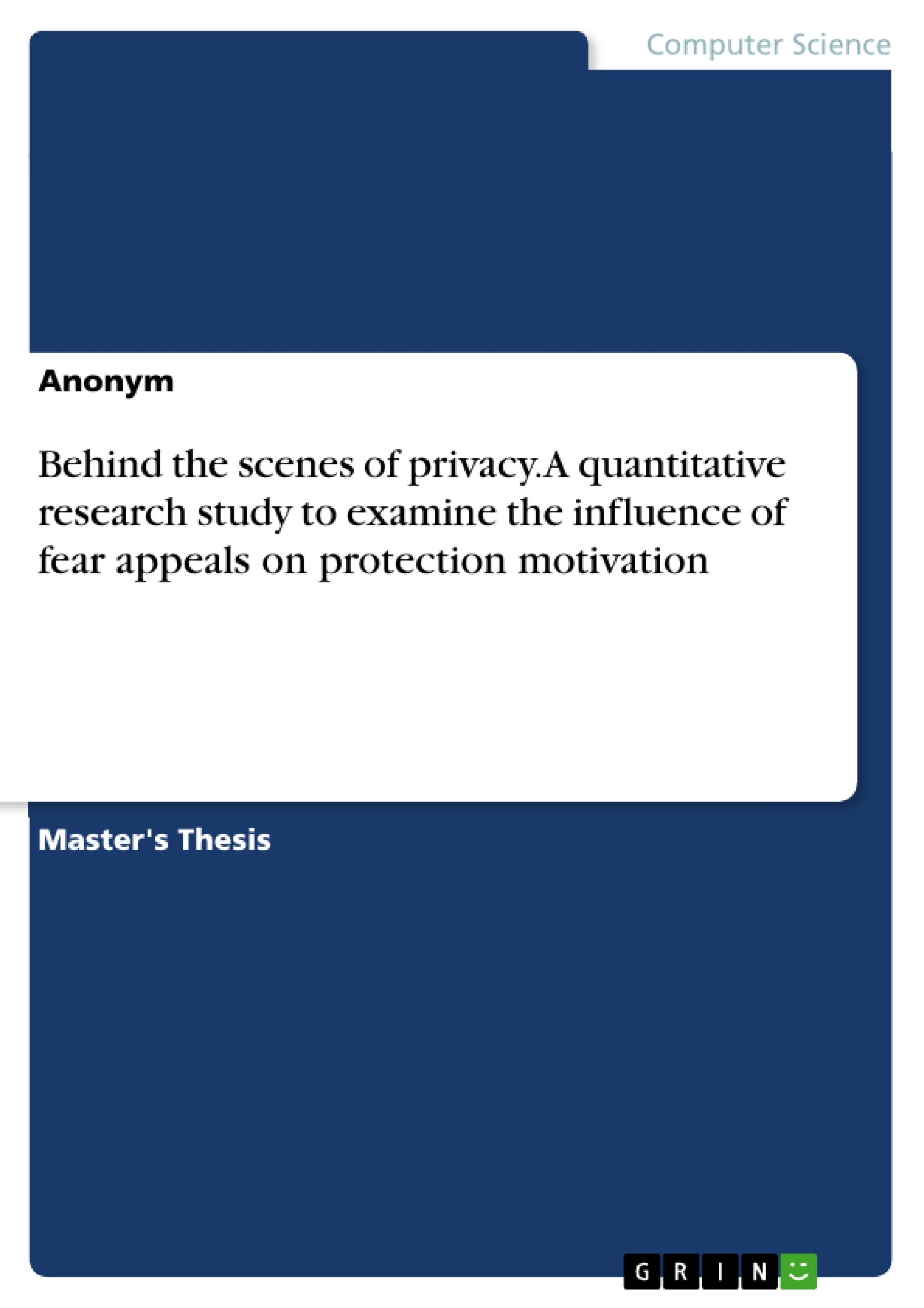This paper deals with the observable and recently emerging concerns of privacy online, such as possible information theft due to data leaks, and methods to motivate people conducting a more adequate behavior. The lack of existing academic literature and research on this phenomenon, is addressed by generating profound results regarding fear appeals and their impact on the intention for people to protect their data. An exploratory, quantitative study design is used, adopted from the protection motivation theory to primarily investigate the components of this model and the modifications of these by means of two groups, one experiencing fear appeals. A set of 25 questions was developed and surveyed within the scope of an online questionnaire. Analysis implied the existence of a positive relationship between fear appeals and protection intention valid. Furthermore, the results support the understanding of connections among the items prompted. The study contributes to the field of research by providing in- depth insights on the influence of fear appeals on the protection motivation. Based on these findings, the thesis concludes with theoretical as well as practical recommendations for future research.
Inhaltsverzeichnis (Table of Contents)
- 1. Introduction
- 2. Theoretical Background
- 2.1 Privacy
- 2.2 Privacy Concerns - Actual Matters
- 2.3 Collection of Information - General Overview
- 2.4 Security Threats and Human Errors
- 2.5 Password Behavior of End Users
- 2.6 Fear Appeals
- 2.7 Development of Fear Appeal Theories and Models
- 2.8 Protection Motivation Theory
- 2.8.1 Design of the Protection Motivation Theory
- 2.8.2 Sources of Information
- 2.8.3 Cognitive Mediating Process
- 2.8.3.1 Threat Appraisal
- 2.8.3.2 Fear
- 2.8.3.3 Coping Appraisal
- 2.8.4 Coping Modes
- 2.9 Research done so far
- 3. Research Model
- 4. Research Method
- 4.1 Research Design
- 4.2 Development of a Measurement Scale
- 4.3 Questionnaire Design
- 4.4 Website "Have I been Pwned"
- 4.5 Survey: Fear-Appeal Manipulation
- 4.6 Data Collection
- 4.7 Participants
- 5. Results
- 5.1 Measurement Validity
- 5.2 Data Analysis
- 5.3 Group Results
- 6. Discussion
- 6.1 Theoretical Implications
- 6.2 Practical Implications
- 6.3 Limitations and Critical Review of Research
- 7. Conclusion
Zielsetzung und Themenschwerpunkte (Objectives and Key Themes)
This Master's Thesis aims to investigate the influence of fear appeals on protection motivation concerning online privacy. It explores the phenomenon of data leaks and information theft and seeks to understand how fear appeals can motivate individuals to adopt better data protection behaviors. The study utilizes a quantitative approach based on the Protection Motivation Theory (PMT) to analyze the impact of fear appeals on protection intention.
- Online privacy and data protection concerns
- Fear appeals and their effectiveness in motivating behavior change
- Protection Motivation Theory and its application in the context of online privacy
- Quantitative research methodology and data analysis
- Theoretical and practical implications of findings for future research and practice
Zusammenfassung der Kapitel (Chapter Summaries)
The thesis begins by introducing the current state of online privacy concerns, including data leaks and the need for individuals to adopt better security practices. It then delves into the theoretical background of privacy, fear appeals, and the Protection Motivation Theory (PMT). The study's research model and methodology are outlined, including the development of a questionnaire and a website survey. Chapter 5 presents the results of the data analysis, focusing on the measurement validity, group results, and the impact of fear appeals on protection intention. Chapter 6 discusses the theoretical and practical implications of the findings, including limitations and a critical review of the research. Finally, the thesis concludes with a summary of the findings and recommendations for future research.
Schlüsselwörter (Keywords)
The key terms and concepts explored in this thesis include online privacy, data protection, fear appeals, Protection Motivation Theory, quantitative research, data analysis, survey methodology, theoretical implications, and practical implications. The study focuses on the impact of fear appeals on protection intention, contributing valuable insights into the complex relationship between fear and behavior change in the realm of online privacy.
Frequently Asked Questions
How do "fear appeals" influence online privacy behavior?
The study finds a positive relationship between fear appeals (warnings about threats) and the intention of users to protect their personal data.
What is the Protection Motivation Theory (PMT)?
PMT is a psychological model used to explain how individuals process threats and decide on coping behaviors, consisting of threat appraisal and coping appraisal.
What role does the website "Have I been Pwned" play in this research?
The website was used as a tool for fear-appeal manipulation, showing participants if their data had been compromised in known leaks.
What are the main components of the cognitive mediating process in PMT?
It includes threat appraisal (severity and vulnerability), fear, and coping appraisal (response efficacy and self-efficacy).
What practical recommendations does the thesis offer for HR or IT security?
It suggests that targeted fear appeals, combined with clear instructions on how to protect data, can effectively motivate end-users to improve their security habits.
- Arbeit zitieren
- Anonym (Autor:in), 2018, Behind the scenes of privacy. A quantitative research study to examine the influence of fear appeals on protection motivation, München, GRIN Verlag, https://www.grin.com/document/457830



